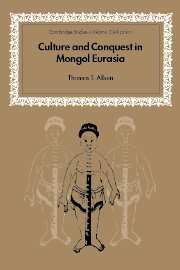2 - Before the Mongols
Published online by Cambridge University Press: 04 September 2009
Summary
By the time of the Mongolian Empire, China and Iran had been in political, cultural, and commercial contact for more than a millennium. In fact, to a large extent China and Iran anchored the exchange of spiritual and material culture between East and West in the premodern era, arguably the longest sustained example of intercultural communication in world history. So extensive were these relations in the past that they have been invoked in recent times as a solid basis for closer diplomatic and cultural cooperation between their modern governments.
To the ancient Iranians, the Middle Kingdom was Chēnastān and its inhabitants, Chēnīk. In Chinese, Iran was initially known as An-hsi, after the Arsacid dynasty of Parthia (ca. 247 BC to AD 227), and later, with the rise of the Sasanians (ca. 222–651), as Po-ssu, Persia. The Chinese, it seems clear, had no direct knowledge of the Far West before the second century BC, the period of the Former Han (202 BC to AD 9). In the reign of Wu-ti (140–87 BC), the Chinese official Chang Ch'ien was sent west to seek an alliance with the Yueh-chih (Tokharians) against the Hsiung-nu, the dominant power in the eastern steppe. When he returned to court in 126 BC he brought the first concrete information on Bactria (Ta-hsia) and Parthia. Following the consolidation of their position in central Asia, the Han in 106 BC sent an embassy to the East Roman Empire (Ta-ch'in) and Parthia which reached the Persian Gulf.
- Type
- Chapter
- Information
- Culture and Conquest in Mongol Eurasia , pp. 8 - 14Publisher: Cambridge University PressPrint publication year: 2001



